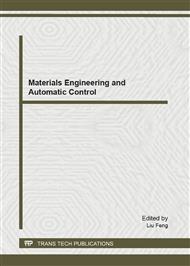[1]
D. Yang, G. Ma, F. Gao: Discussions On the Unified Price of Electricity Sent Into Grid for Cascade Hydropower Stations, Water Power Vol. 32 (2006), P. 1-3.
Google Scholar
[2]
W. Kou, Z. Guo, J. Zhang: Optimal Scheduling for Cascaded Reservoirs with Different Power Pricing Policies, Water Resources and Power Vol. 28 (2010), P. 160-163.
Google Scholar
[3]
E. Bompard, E. Carpaneto, G. Ciwei: A Game Theory Simulator for Assessing the Performances of Competitive Electricity Markets, Electric Power Systems Research Vol. 78 (2008), P. 217-227.
DOI: 10.1016/j.epsr.2007.02.007
Google Scholar
[4]
L. Geerli, L. Chen, R. Yokoyama: Pricing and Operation in Deregulated Electricity Market by Noncooperative Game, Electric Power Systems Research Vol. 57 (2001), P. 133-139.
DOI: 10.1016/s0378-7796(01)00094-3
Google Scholar
[5]
B. Han, L. Zhang, J. Shu: Bidding Model of Cascaded Hydropower Stations and Equilibrium Solving Under Agency Mechanism, Chinese Society for Electrical Engineering Vol. 28 (2008), P. 94-99.
Google Scholar
[6]
Z. Tan, X. Li, Y. Liu: Game Models and Solutions in the Competitive Electricity Market, Transactions of China Electrotechnical Society Vol. 19 (2004), P. 42-50.
Google Scholar
[7]
J. Ma, W. Ji: Complexity of Repeated Game Model in Electric Power Triopoly, Chaos, Solitons & Fractals Vol. 40 (2009), P. 1735-1740.
DOI: 10.1016/j.chaos.2007.09.058
Google Scholar
[8]
M. Chwe: Farsighted Coalitional Stability, Journal of Economic Theory Vol. 63 (1994), P. 299-325.
DOI: 10.1006/jeth.1994.1044
Google Scholar
[9]
A. Ambrus: Theories of Coalitional Rationality, Journal of Economic Theory Vol. 144 (2009), P. 676-695.
DOI: 10.1016/j.jet.2007.03.010
Google Scholar
[10]
E. Shellshear, P. Sudh Lter: On Core Stability, Vital Coalitions, and Extendability, Games and Economic Behavior Vol. 67 (2009), P. 633-644.
DOI: 10.1016/j.geb.2009.01.005
Google Scholar
[11]
T. Arnold, U. Schwalbe: Dynamic Coalition Formation and the Core, Journal of economic behavior & organization Vol. 49 (2002), P. 363-380.
DOI: 10.1016/s0167-2681(02)00015-x
Google Scholar
[12]
H. Konishi, M. Le Breton, S. Weber: On Coalition-Proof Nash Equilibria in Common Agency Games, Journal of Economic Theory Vol. 85 (1999), P. 122-139.
DOI: 10.1006/jeth.1998.2481
Google Scholar
[13]
L. Xue: Coalitional Stability Under Perfect Foresight, Economic Theory Vol. 11 (1998), P. 603-627.
DOI: 10.1007/s001990050204
Google Scholar
[14]
H. Vartiainen: Dynamic Coalitional Equilibrium, Journal of Economic Theory (2010).
Google Scholar
[15]
H. Konishi, D. Ray: Coalition Formation as a Dynamic Process, Journal of Economic Theory Vol. 110 (2003), P. 1-41.
Google Scholar


